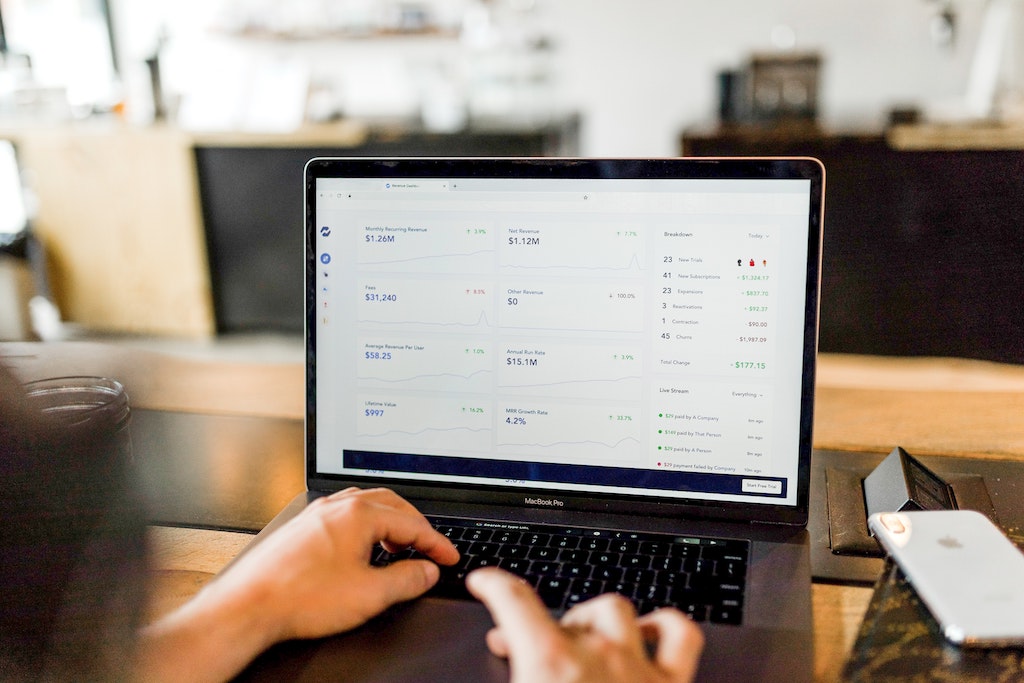How To Start An Online Business In 7 Steps

This post may contain affiliate links. I only recommend products I trust or personally use. Please read our disclaimer for more info.
Alright! Time to get to business!
YOUR business, that is!
Have you ever thought of diving into the world of business ownership? Being your own boss and achieving financial independence?
Well seeing as how you’re here, I’m going to assume probably yes.
You’re not alone!
More and more young Americans these days are becoming young entrepreneurs and starting an online business of their own.
Online businesses are the new wave. While they do follow many of the same steps of traditional brick and mortar businesses, they have key differences that need to be known in order to find success.
Starting an online business is, as you might imagine, an endeavor that takes careful planning and execution to be successful, but it is also an endeavor that is very doable.
So if you’ve ever wondered how to start an online business, you’re in luck.
Gathered here, you’ll find the first steps to curating, launching and growing a business of your very own.
Understand first and foremost: This won’t be a tea party. Hard work, dedication, and drive will be paramount. Self-discipline is a must.
There will be costs, not the least of which will be a fair share of your own time and effort.
But keep your eyes on the prize, and let’s start the next big online craze!
1. Decide what you want your business to be.
“Good business leaders create a vision, articulate the vision, passionately own the vision, and relentlessly drive it to completion.” -Jack Welch
First things first. We can’t start a business with no idea what it is that we want the business to be, and you can’t be a good businessman (or woman, shout out to my boss ladies) if you aren’t ready to take the lead and lead the charge.

So it’s time to shift your gaze from “how to start a business online” to “what kind of business do I want to start online?”
Try answering this question: What will be the subject or service offered by your business?
This simple question is deceptively complex.
You want to develop your niche, or in simpler words, your specialized version of your specific product to your target audience.
For example, let’s say I love baking. Took Home Ec in highschool (because who doesn’t love eating cookies for a grade, don’t judge me.) and I just crushed it.
Next thing I know, I’m the one making the family birthday cakes.
Now one day a family friend sees one of my masterpiece cakes and wants one too. They even offer me money for it.
This sparks an idea.
A few years later I decide to take that skill that I already love and start an online business.
In that example, I’ve already decided what I want my business to be, baking birthday and other cakes, and I have my niche.
(Let’s be clear… I can’t bake, like at all. Not even those pre-made cinnamon rolls you just open up. I burn them EVERY time. This was just an example.)
It’s important to try to focus your business concept around something that you have skill in and that you’re passionate about.
After all, the hope is that this will become something you do for a very, very long time.
“There’s no shortage of remarkable ideas, what’s missing is the will to execute them.” – Seth Godin
Another thing to keep in mind is that while the skill and the passion behind it are important, you must weigh those ideas against whether or not there is a market online for your niche.
Let’s try out another example. Let’s say that you discover at some point in your life (I won’t ask how) that you have the ability to masterfully shave spiders with a scalpel. You can even give them cool little hair designs.
While this is an…err…impressive talent and an uber specific niche, I think you’ll find that there is not much of a market for the spider-barber. (Although, you could probably make some wicked viral content on YouTube.)
So understanding the differences between a marketable skill and a non-marketable skill is key when coming up with the rough draft for your business, from deciding the product/service all the way to what the business name will be.
2. Researching market viability.
“Without data, you’re just another person with an opinion.” – W. Edwards Deming
Alright, so you’ve decided on a concept/focus for your new online business. Let’s say you’ve decided to sell 90’s-early 2000’s memorabilia.
You’ve got your Tamagotchi pets and your sweet, sweet Pokemon cards and you’re all ready to go. The next step is to research the market viability for your product.
Market viability put extremely simply is a realistic estimate of what your product’s future revenue could be. The higher the number, the better for your business.
You’ll want to decipher whether or not your business can flourish, growing and expanding into a successful online business.
There are many ways to study the market viability of a product. Some of them are quite expensive and incredibly involved. This is not to say that these are bad options.
For example, concept testing is a process by which you discover how many people are interested in purchasing your collection of Pogs and yo-yo’s. This will be determined by collections of surveys and questionnaires and is a potent tool in researching market viability, but these things come with a price tag.
For now we’ll focus on less expensive, more manual ways to study the market viability for your online business. After all, most of us aren’t independently wealthy.
Compare pricing data with your competition
While your competition is your biggest…competition, they are actually more valuable than they are detrimental. At least at the beginning.
After all, you aren’t going to just pop into the game and be a direct competitor with giants like Amazon.
That being the case, we’ll begin studying the metrics of our new business by studying the metrics of what will be our closest competitors.

Take pricing for example. Your online business’s price point will determine a lot of the type of consumer you attract.
So deciding where you set the pricing of your product should begin with studying the price point of your closest competition.
Do you want to just barely beat the opposition’s pricing? Or maybe you’re going for the luxury look, and you plan to set a slightly higher price point.
That’s up to you, but remember that you have to do something to make yourself stand out.
If you’re more expensive, for example, maybe you have top-tier customer service or an excellent return policy. Maybe you include a handwritten note with each delivery.
For example, one of the reasons people choose to read my blog over other similar blogs on the internet (which really truly means the world to me) is because my story resonates with them.
When I started my online business, I had no idea that one of my biggest assets to attracting readers and followers of my website would be my story. But, it sort of just happened that way.
Another thing to consider is the ROI on your product versus the competitive pricing. If you’ll have to sell your vintage Tamagotchi’s at $5 per to be able to make a sale, but it costs you $4.50 to acquire each one, you’ve got a pretty crappy profit margin.
This is highly valuable data, because it helps you realize that something in YOUR business model needs to change to be truly profitable.
Research how much business your competition is doing
If others in your market aren’t doing well, or had to supplement their business with other products, perhaps your product isn’t very viable.
While we’re in the market of tapping your competition for information, we can also check the saturation of the market, or how many companies are vying for domination of the same space.
Too much competition is not a particularly good thing. If you want to start a streaming service, you’re probably going to have a hard time since Netflix, Hulu, Disney+ and others have pretty much saturated the market.
Going back to the Tamagotchi example, if you watch the competition’s pricing for 6 months and they keep ticking the price lower and lower, you can assume they’re struggling to make sales and the market for these items is either shrinking or stalling.
Probably not the right time to dive into that as your new online business venture, ya know?
Do the same thing, but better.
“Your most unhappy customers are your greatest source of learning.” – Bill Gates
What do you think the best way is reach your consumer base and see what’s working and what needs work?
Comments! Never underestimate the power of the almighty comment section. Not everybody goes to the comment section just to troll.
Here you have a unique opportunity to see what you might do wrong before you ever have the chance to make the mistake! Learn from your competitors’ mistakes by reading through their comments and reviews.
If every review on a competitor’s vintage Tamagotchi sales page says “great product, works fine, but a week after I bought it I realized why I got rid of mine as a kid…”
Well, this is not a business that sounds like happy customers left and right, does it?
3. Develop a business plan.
“If you really look closely, most overnight successes took a long time.” – Steve Jobs
Here’s where we start getting into the nitty-gritty of building your business. Luckily, because you’re all so well prepared, you’ve already got certain aspects of this step begun.
During this step you will fine tune your business concept, considering things like funding and harder numbers on how much revenue you can expect to bring in, and how much you’ll need to begin.

This will be the format that banks will want to see if you’re planning on taking out a loan to fund your business.
You already have faith in your business idea, but a well-developed business plan will give other people that same faith.
You’ll want to be able to prove that you have a viable idea and have the know-how to make it profitable.
It’s at this stage that you may want to perform a SWOT analysis.
A SWOT analysis is simply a strategic planning technique used to help a person or organization identify strengths, weaknesses, opportunities, and threats related to business competition or project planning.
In other words, it’s a more in-depth version of the research you’ve already gleaned off your opposition.
How do you accomplish this? It’s actually not so difficult.
SWOT stands for: Strengths, Weaknesses, Opportunities, and Threats.
A simple brainstorm and some research will provide you all the information you need.
It’s important at this step to make sure that you’re being as honest as you can with yourself. Be honest about your ideas’ strengths and weaknesses. This will give you the best chance and opportunity for success.
How are we planning on funding this project? In fact, how much will the startup costs be? Are there materials or tools that we need before we begin? Will we need to hire employees?
This all must be considered at this point. A lending establishment isn’t likely to want to give you money if you can’t convince them you’ll be able to make their money back with interest.
If you don’t even know how much start-up money you’ll need for each specific point in the process, you’re not likely to get anything.
The great news when starting an online business is that you can almost always do it without getting funding. The cost to starting your own online business can be as little as $100 bucks.
(In fact, although I have continued to invest more and more over time, something you should do to grow any business, I started this site with only $130.)
4. Study your local laws!
Okay, here comes the red tape!
When beginning any business it’s a good idea to go ahead and give the law a gander.
The last thing you want is to build a business from the ground up and taste the sweet fruit of success just to have it ripped from you through lawsuits or because you violated some law that you were unaware of.
The laws governing business will vary depending on your state. Educate yourself and protect yourself.
Just like you don’t want to rip anybody off you don’t want to be ripped off. So do your research.
Some things to consider are:
- Do I need to register my business?
- Do I need to worry about sales tax?
- What business taxes do I need to pay?
- What do I need to know about accounting and handling the income my business brings in?
- Is my business even legal in my state?
- Are their shipping restrictions for the product I sell (both for shipping carriers and for ship-to states)?
- Am I covered on my liabilities? (Think health products and medical claims risks/lawsuits, etc.)
- Do I need any special certifications to legally carry out my business?
I wouldn’t get TOO caught up in all of this, as with most online businesses, you are going to be able to operate with no issue.
That being said, you do want to make sure you have the proper legal templates for your business, as well as abide by any practices that are required for your business.
5. Build that website.
Once you’ve got your idea down pat, have built yourself a strong business plan, and know where you’ll be getting your funding, it’s time to build your website.
There’s a lot to remember when you’re building a website.
Consider the look your audience wants to see.
Think about your target audience. Your webpage will literally be the face of your business. It’s the first thing people will see when they come to peruse your site.
Your image is incredibly important. A sloppy web page will lose you prospective customers.
Likewise, you can have the most beautiful website in the world, but if it misses the mark with your target demographic, you’ll lose money.
If you are selling stuffed animals for children, you probably don’t want an extremely rigidly professional, corporate looking website.
Decide how you’ll get your site built.
Another thing to consider is your level of skill with web page design.
If you are a master-level designer, you’re in luck! If you have the time to put into designing your own webpage you’re in an ideal position.
If not, like most of us, how is it that you’re going to go about starting a website?
There are many options, and this is something that you should already have the answer to since you have that wicked good business plan already you sly dog.
Perhaps your plan is to hire a designer. This isn’t a bad plan. Keeping an open line of communication is paramount in this case.
Don’t forget, this is your baby. You’ve built it from the ground up. This is the first aspect of your company that others will see. You know what they say about first impressions.

This is ten-fold when dealing with the internet. Remember that just like someone found you, your competition, literally ALL OF THEM, are just a click or a scroll away.
Why would someone even waste time with a company with a web page that’s not immediately appealing? NEXT!
So you have to craft your webpage with your ideas through the hands of another. Not always the easiest thing.
At the end of the day remember that the website is the most important of the early processes. If you aren’t happy with it or it doesn’t do what you need it to do, chances are others aren’t gonna dig it either.
If you’re trying to save a few dollars at this step, there are plenty of online resources at varying price points that will allow you to use templates to build a website yourself. Little to no HTML or coding experience required!
(YouTube is going to be your best friend during this process)
Either way has its merits, and there’s no way to say which one is better overall, it boils down to what’s better for your personal online business.
Choose your domain name (and company name) wisely.
Also try, if at all possible, to make sure that your domain name matches your company’s name.
You want it to be as easy as possible for your customer base to get to where you are selling.
What you don’t want is for someone to hear about you, go to “[your dope new business].com” and find nothing.
Swipe. Suddenly you’re lost to the internet ether and you’ve lost yet another potential customer.
Think about it, there’s got to be a reason that Facebook.com paid 200,000 dollars to change it’s domain from Thefaceboook.com.
We want to avoid such hefty bills if at all possible, so be wise when you name your company and purchase your domain (i.e. consider tweaking your company name to match an available domain).
Also, as more and more people are opting for the smaller hand-held devices to do their online browsing and shopping, It would definitely behoove you to make your website mobile-friendly.
6. Marketing and driving traffic.
Now that you’ve got your website up and running, (it’s gorgeous by the way, congratulations!) it’s time to push people toward your site specifically.
In most cases you certainly won’t be the only business selling your product. How do you set yourself apart?
Google, the powerhouse that it is, drives a lot of business.
Think about it. How many times have you Googled something and clicked on literally the first result? Turns out you’re not alone. A huge number of people do the same thing.
The chances of getting that coveted click drop, the further away from the top you get. You hit the second page and well…I only just recently learned there was a second page. (Obviously kidding since SEO is my claim to fame in the blogging community…)
But, you get the point.
We want to get your business to the top of that google search result!
How do we do this?
Consider starting a blog.
Seriously. Starting a blog in conjunction with your business is a win win scenario where each advertises for the other.
As a blog grows, it can be its own revenue source while still performing the task of driving business to your digital front door.
And how does your blog grow?
Google likes certain keywords, and if you put enough of them in your blog entries, you’ll be more likely to end up near the top.

This drives traffic to your blog, which is an extension of your business and grows them both simultaneously.
Maybe consider a YouTube channel. If one thing has proven to be absurdly popular, it’s unboxing videos.
With a ready supply of your own product, and a charismatic personality, a few videos a week can lead to even more revenue from ads and more free publicity to drive traffic to your business.
Also never underestimate the power of social media like Facebook, Twitter, and Instagram.
All the biggest names in the game have a powerful social media presence and there’s a reason.
7. Make it official.
You’re almost there, new entrepreneur! A few more steps and you’ll be the proud owner of a fully operational, legal business.
Your next job will be to register your company. Will business be an LLC? A Corporation? A DBA?
Many online companies are LLC’s and it’s probably a safe bet for your new business. The decision will ultimately be up to you and the direction you want to take your business in.
I also want to emphasize that you CAN operate as a sole proprietor at the start and that you don’t have to spend HOURS trying to figure out what you need type of entity you need to register your online business as.
The most important thing is that you START.
But if you do insist, be sure to thoroughly research the different types of businesses in order to make the right decision.
A limited liability company (LLC) is a business structure in the United States whereby the owners are not personally liable for the company’s debts or liabilities.
Limited liability companies are hybrid entities that combine the characteristics of a corporation with those of a partnership or sole proprietorship.
A corporation is a legal entity that is separate and distinct from its owners.
Corporations enjoy most of the rights and responsibilities that individuals possess: they can enter contracts, loan and borrow money, sue and be sued, hire employees, own assets, and pay taxes.
A DBA is the operating name of a company, as opposed to the legal name of the company.
Some states require DBA or “fictitious business name” filings to be made for the protection of consumers conducting business with the entity.
Bear firmly in mind that the type of business that you choose will change the way in which the business taxes must be filed.
Oh, yes. There will be taxes.
The last thing we want is to incur the wrath of Uncle Sam or the IRS, FBI, IRA, LOL, and all of those other three-letter name entities. (okay.. I’m kidding on the FBI, IRA, LOL)
But, as tax law gets very complex, my personal suggestion would be to hire a professional once your business begins to bring in money or require large amounts of money to run.
These individuals will be able to navigate the waters, getting you tax breaks where possible, manage your business income properly, and keeping you from getting in trouble.
Congratulations, you’ve done it!
You have successfully imagined, planned, and built your own brand new, shiny business from the ground up. I knew you could do it!
It’s not time yet to rest on your laurels.
In fact, it never is!
“There is no finish line. There are only mile markers.” -Michael Ventura

That’s right, with a business the work is never done! Never fear, though, as you grow so will your business.
Never stop working toward the betterment of your online business, and know that the sky’s the limit.
Final Thoughts On How To Start An Online Business
As your online business begins to flourish, be sure to study what works, what doesn’t and continue to make changes as you see fit to ensure that your online business continues to be as profitable and user friendly as possible.
Maybe you’ll find that the product you’re offering could need some work or tweaking, or maybe you’ll discover a new product altogether!
Once your online business is self-sustaining and profitable, this is a possibility that you can explore.
Maybe you’ve discovered that an unsuspected demographic is making up a larger percentage of your user-base.
It may be a valuable idea to recraft your website to reflect that.
The business you create is a living thing in and of itself. If you give it what it needs it will flourish.
So go on, my new entrepreneurs! Take the world by storm! I hope to be a customer of whatever online business you build one day.

Hey! I'm Noah Riggs.
Noah is the founder of Busy Living Better and has built a life he loves, despite growing up poor. He shares exactly how he started his six-figure business, became financially stable, and lives his best life so that he can help you do the same. You can read more about how he did all of this before the age of 23!
